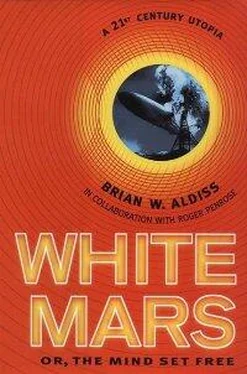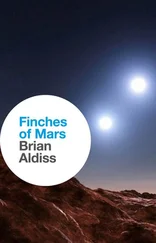Brian Aldiss - White Mars
Здесь есть возможность читать онлайн «Brian Aldiss - White Mars» весь текст электронной книги совершенно бесплатно (целиком полную версию без сокращений). В некоторых случаях можно слушать аудио, скачать через торрент в формате fb2 и присутствует краткое содержание. Год выпуска: 1999, ISBN: 1999, Издательство: Little, Brown UK, Жанр: Фантастика и фэнтези, на английском языке. Описание произведения, (предисловие) а так же отзывы посетителей доступны на портале библиотеки ЛибКат.
- Название:White Mars
- Автор:
- Издательство:Little, Brown UK
- Жанр:
- Год:1999
- ISBN:0-316-85243-0
- Рейтинг книги:5 / 5. Голосов: 1
-
Избранное:Добавить в избранное
- Отзывы:
-
Ваша оценка:
- 100
- 1
- 2
- 3
- 4
- 5
White Mars: краткое содержание, описание и аннотация
Предлагаем к чтению аннотацию, описание, краткое содержание или предисловие (зависит от того, что написал сам автор книги «White Mars»). Если вы не нашли необходимую информацию о книге — напишите в комментариях, мы постараемся отыскать её.
White Mars — читать онлайн бесплатно полную книгу (весь текст) целиком
Ниже представлен текст книги, разбитый по страницам. Система сохранения места последней прочитанной страницы, позволяет с удобством читать онлайн бесплатно книгу «White Mars», без необходимости каждый раз заново искать на чём Вы остановились. Поставьте закладку, и сможете в любой момент перейти на страницу, на которой закончили чтение.
Интервал:
Закладка:
Somehow I felt depressed.
Even when I had my babe back in my arms, a feeling of my insignificance in the scheme of things persisted. To arrange for Jon Thorgeson to come at last and give his lecture on the Omega Smudge was a welcome diversion.
Paula Gallin helped me in the early stages. She found a small lecture hall we could use. Lectures made in person had proved more vital than lectures delivered over the Ambient—though I had no suspicion regarding the way this one was going to turn out. While I had forgotten about Jon in my preoccupation with dear Alpha, he had not forgotten his promise.
“Ah, my little honeypot!” was his greeting. I made no retort because it was pleasant to see his young-old face light up at sight of me. He was followed into the anteroom by a porter trundling a large man-size crate. Once it was set down, and was stood upright, Jon thumped it.
“There’s someone in here who can see what we are doing. Give me a kiss before I let him out.”
I put up my hands defensively. “No, I don’t do that sort of thing.”
“I wish you did,” he said, with a sigh. I was angry. The truth was, he was attractive after a fashion; it was just that his manner was so pushy. In a burst of confidence, he told me that he had left a Chinese lover back on Earth. I was a physical reminder to him of this lady. He longed to get back to her. He was miserable on Mars; it was for him a prison. “Sorry to offend you,” he said, with a hangdog look.
He turned and unlatched the box the porter had brought. “This is my visual aid,” he said, over his shoulder. The door of the box opened. A small android stepped out from its padded interior.
“Where am I?” it asked in a lifelike way.
“On Mars, you idiot.” Turning to me, Jon said, with mock-formality, “Cang Hai, I’d like you to meet my friend, Euclid.”
“I have met him before,” I said, although no recognition was forthcoming from the android.
I offered Euclid my hand. It did not move. Nor did its well-moulded face manage more than a twitch of smile.
“It’s one of Poulsen’s cast-offs,” said Jon. “I borrowed it for the occasion. It’s house-trained.”
I remembered it then as one of the machines Poulsen had complained about. The android was dressed in blue overalls, much as Thorgeson was dressed. Its hair was cut to a fashionable length, unlike Jon’s which was trimmed short. Its face wore a blankly pleasant expression which changed little. Jon clapped it on the shoulder.
There was something in its extreme immobility I found disconcerting. It had no presence. It gave out no CPS. It lacked body language.
Jon turned to me with a grin. “Kathi tells me you are a mother now! Was it a virgin birth?”
“Change the conversation. It’s none of your business. You didn’t come here to be insulting, I hope.”
He shrugged, dismissing the topic. “All right, you invited me over just to talk science. And when I get in that hall, I am going to talk about the continuing search for the ultimate smudge. All miseries forgotten.”
“Let’s go. The audience is waiting. How long will you talk for?”
“My lecture is designed for ten-year-olds,” said Thorgeson. “Euclid helps to hold their interest through the technical bits.” He caught my wrist. “Do you think the audience knows anything of the past history of particle physics?” As he spoke, he slid an arm about my waist.
“I think you can count on it,” I said, disengaging myself.
“Oh, good. Then I had better not go into all that too much. How long have I got to talk?”
“Until you lose their interest. Now come on and don’t be nervous.”
He was anything but nervous with me. “Be nice to me,” he begged. “I only came over to see you again.”
I told him not to be silly. But I was not completely annoyed.
We went into the hall, followed by the android. The audience gave us a round of applause. I introduced Thorgeson by saying that he would explain why there were so many scientists on Mars, and that he would speak of the problems they were hoping to solve. He would touch on matters affecting us all. His artificial friend, I said, would assist him.
Tom sat in the front row and nodded approval of my short speech—the first I had made before such a large gathering.
Thorgeson began nervously, clearing his throat and gesticulating too much.
“As our understanding of the basic units of the universe deepens, it becomes yet clearer that these units are entities that possess no mass. There is a profound mystery here. Ordinary matter obviously possesses mass, and so do the basic particles of which matter is composed—protons, neutrons, and electrons, and also their constituent quarks and kliks. For many decades, physicists have struggled with the question: where does mass come from?
“This is a serious issue. Without mass everything would disintegrate. We’d be instantly dispersed into a flash of ethereal substance—not even mist—spreading outwards with the speed of light. Not a brilliant way to get to the nearest star.”
The feeble joke earned chuckles enough from the audience for Thorgeson to relax a little.
Euclid spoke. “So tell us, what is the purpose of the Mars Omega Smudge Project?”
Glancing at a prepared script, Thorgeson continued, “The Omega Smudge is what has brought us here. To explain why we call this vital smudge a smudge I should remind you of some history of particle physics last century and earlier this century.
“Euclid, do you remember the names given to the six varieties of basic subnuclear entity which was postulated last century?”
Euclid: “Down, Up, Strange, Charm, Bottom, Top.”
“He has a faultless memory,” Thorgeson said, as another chuckle ran through the listeners.
He continued for a while, describing highlights of twentieth-century particle physics, which I was able to follow mainly because of Kathi’s earlier explanations.
He was saying,’… the superconducting supercollider or SSC that was planned to be built under Texas was a miracle that did not quite happen. It would have cost billions and was designed to discover what was referred to as ‘the Higgs particle’. I see that some of you DOPs remember the name, though, of course, not the excitement of the time.
“Here’s an artist’s impression of the proposed SSC entrance.” He showed a vidslide in 3D of an airy and imposing glass structure, topped by a geodesic dome.
Euclid: “Why would anyone think that so much money should be spent in search of a single particle?”
“It’s a good question, Euclid. In the end the US Congress dropped the project. But the physicists—why, they argued that finding the elusive ‘Higgs’ would have supplied them with the answer to the question of what comprises the basic units of the universe.”
Euclid: “Did they believe that in those days?”
“Well, maybe not quite. But they did regard the finding of the Higgs as vitally important in their scheme of things. Also, completing the SSC would have achieved other targets. They put all their eggs in one basket to get the collider funded. The argument became over-heated. Certain physicists assigned an almost religious quality to the Higgs, referring to it as ‘the God particle’—a good journalistic phrase…”
Euclid: “Did they believe that in those days?”
Thorgeson looked nonplussed. “No Euclid, that’s where you say, ‘Why was the Higgs regarded as so important?’”
Amid sympathetic laughter, Euclid spoke. “Why was the Higgs regarded as so important?”
At his ease now, Thorgeson said, “I’m glad you asked me that, Euclid. It all has to do with the question of mass. You are aware that most particles of nature have mass, but the photon and graviton—the basic quanta of electromagnetism and gravitation respectively—are exceptions. Those quanta of which matter is mainly composed, the protons and neutrons or their constituent quarks, are massive particles. So also are the kliks and pseudo-kliks that compose the much less massive leptons, such as electrons and muons.”
Читать дальшеИнтервал:
Закладка:
Похожие книги на «White Mars»
Представляем Вашему вниманию похожие книги на «White Mars» списком для выбора. Мы отобрали схожую по названию и смыслу литературу в надежде предоставить читателям больше вариантов отыскать новые, интересные, ещё непрочитанные произведения.
Обсуждение, отзывы о книге «White Mars» и просто собственные мнения читателей. Оставьте ваши комментарии, напишите, что Вы думаете о произведении, его смысле или главных героях. Укажите что конкретно понравилось, а что нет, и почему Вы так считаете.










